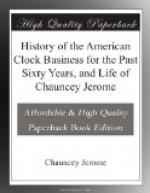We went on very prosperously making the new clock, and it was admired by every body. In the year 1839, some of my neighbors and a few of my leading workmen had a great desire to get into the same kind of business. We knew competition amongst Yankees was almost sure to kill business and proposed to have them come in with us and have a share of the profits. An arrangement to this effect was made and we went on in this way until the fall of 1840. I found they were much annoyance and bother to me, and so bought them all out, but had to give them one hundred per cent. for the use of their money. Some of them had not paid in anything, but I had to pay them the same profits I did the rest, to get rid of them. One man had put in three thousand dollars for which I paid him six thousand. I also bought out my brother Noble Jerome, who had been in company with me for a long time, and carried on the whole business alone, which seemed to be rapidly improving.
I made in 1841, thirty-five thousand dollars clear profits. Men would come and deposit money with me before their orders were finished. This successful state of things set all of the wood clock makers half crazy, and they went into it one after another as fast as they could, and of course run down the price very fast—“Yankee-like.” I had been thinking for two or three years of introducing my clocks into England, and had availed myself of every opportunity to get posted on that subject; when I met Englishmen in New York and other places, I would try to find out by them what the prospects would be for selling Yankee clocks in their country. I ascertained that there were no cheap metal clocks used or known there, the only cheap timepiece they had was a Dutch hang-up wood clock.
In 1842, I determined to make the venture of sending a consignment of brass clocks to Old England. I made a bargain with Epaphroditus Peck, a very talented young man of Bristol, a son of Hon. Tracy Peck, to take them out, and sent my son—Chauncey Jerome, Jr. with him. All of the first cargo consisted of the O.G. one day brass clocks. As soon as it was known by the neighboring clock-makers, they laughed at me, and ridiculed the idea of sending clocks to England where labor was so cheap. They said that they never would interfere with Jerome in that visionary project, but no sooner had I got them well introduced, after spending thousands of dollars to effect it, than they had all forgotten what they said about my folly, and one after another sent over the same goods to compete with me and run down the price. As I have said before, wood clocks could never have been exported to Europe from this country, for many reasons. They would have been laughed at, and looked upon with suspicion as coming from the wooden nutmeg country, and classed as the same. They could not endure a long voyage across the water without swelling the parts and rendering them useless as time-keepers; experience had taught us this, as




